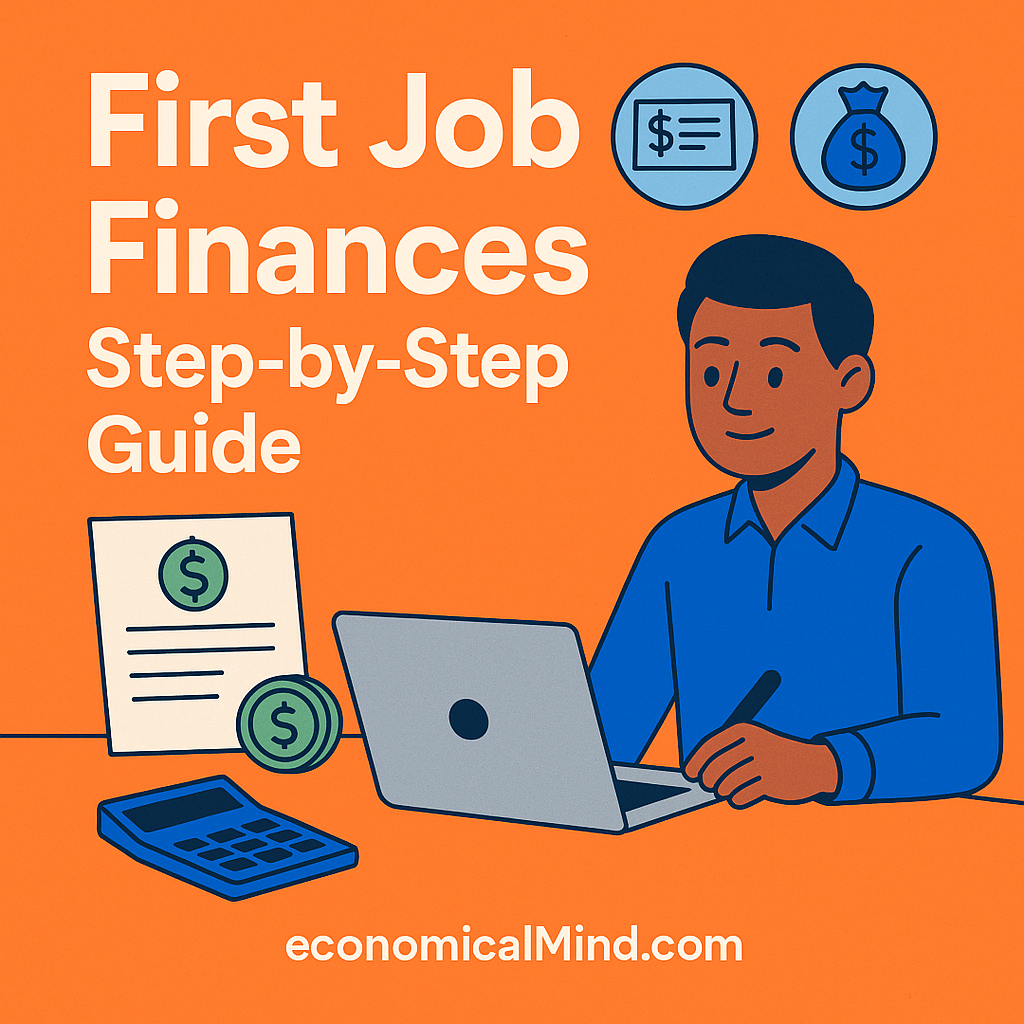
Why Your First Job Matters Financially
Landing your first job is exciting — it’s your first taste of independence and your first steady paycheck. But it’s also the moment when good financial habits can set you up for life.
Whether you’re just out of school or switching careers, learning how to budget, save, and plan early helps you avoid debt and build confidence in your financial future.
Step 1: Understand Your Paycheck
Your first paycheck might be smaller than expected — that’s because of taxes and deductions.
Here’s what’s typically taken out:
- Federal and state income taxes
- Social Security and Medicare (FICA)
- Health insurance premiums (if provided)
- Retirement contributions (401k or similar)
Check your pay stub each month to understand how much you’re earning and where your money’s going.
If you’re over-withheld on taxes, you may get a refund later — or you can adjust your W-4 form to keep more upfront.
Step 2: Create Your First Budget
A budget helps you see how far your paycheck really goes.
Start with the 50/30/20 rule as a simple framework:
- 50% for needs (rent, food, transportation)
- 30% for wants (entertainment, eating out)
- 20% for savings and debt repayment
Use free tools like Mint, YNAB, or EveryDollar to track spending.
The goal isn’t restriction — it’s awareness. Knowing your numbers gives you control.
Step 3: Build an Emergency Fund
Life happens — and your first job won’t protect you from surprise expenses.
Start small by saving $500–$1,000 as a starter emergency fund.
Once you’re stable, aim for 3–6 months of expenses in a high-yield savings account.
This safety net protects you from going into credit card debt if something unexpected occurs (like car repairs or job changes).
Step 4: Start Building Credit
Your credit score will affect your ability to rent, get loans, or even qualify for some jobs.
To build credit safely:
- Open a starter credit card (secured or student card)
- Use it for small purchases and pay the balance in full each month
- Keep your utilization below 30% of your credit limit
- Always pay on time — one late payment can drop your score fast
If used responsibly, your credit card becomes a tool, not a trap.
Step 5: Take Advantage of Employer Benefits
Your job might offer perks that go beyond your paycheck.
Common benefits include:
- 401(k) or 403(b): Contribute at least enough to get the employer match — it’s free money.
- Health insurance: Choose the right plan for your needs (HDHP vs PPO).
- HSA or FSA accounts: Save pre-tax for medical expenses.
- Professional development funds: Free training or certifications can boost your career value.
Read your benefits packet carefully — understanding these options can add thousands in long-term value.
Step 6: Automate Your Savings
Make saving effortless by setting up automatic transfers from checking to savings every payday.
Even if it’s just $50–$100 per check, consistency builds momentum.
You’ll be amazed how quickly small amounts grow — and you won’t be tempted to spend money you never see.
Automation is the easiest way to stay consistent without constant discipline.
Step 7: Avoid Lifestyle Creep
As your income rises, it’s tempting to upgrade everything — apartment, car, clothes.
That’s called lifestyle inflation, and it quietly steals your long-term wealth.
To prevent it:
- Keep living like a student for a while
- Increase savings when you get a raise
- Focus on long-term goals, not short-term upgrades
Financial freedom comes from living below your means, not matching everyone else’s lifestyle.
Bonus Tip: Learn About Investing Early
Once you’ve built savings and paid down any high-interest debt, start investing.
Begin with low-cost index funds or your employer’s 401(k) plan.
Even small contributions compound over time — investing $100 a month at age 22 can grow to $200,000+ by retirement.
Final Thoughts
Your first job is more than a paycheck — it’s your launchpad for financial independence.
By budgeting, saving, building credit, and using benefits wisely, you’ll lay the foundation for lasting wealth and confidence.
Start now. The habits you form in your 20s will define your financial story for decades to come.
